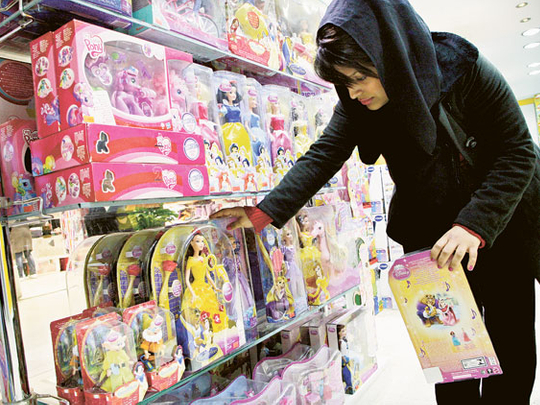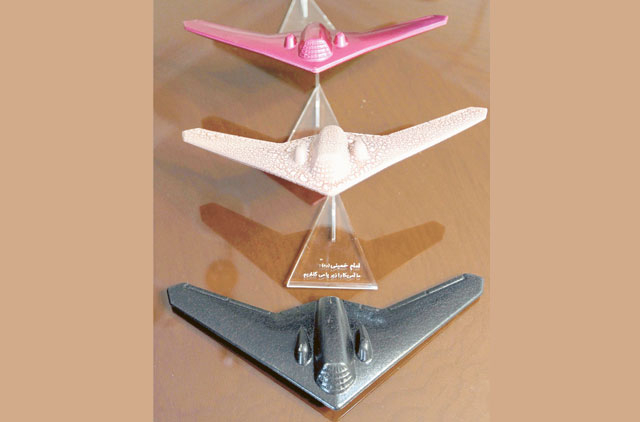
Tehran: Toy shelves in Tehran will be making room for a new design that will make some Iranians smile and US officials grind their teeth: a scale model of the American stealth drone that Iran brought down in early December.
Iranian officials trumpeted an "intelligence coup" when they brought down the top-secret batwing craft that had been on a CIA spying mission over Iran's nuclear facilities.
An Iranian engineer working to unlock the secrets of the drone told the Monitor at the time how Iranian electronic warfare specialists had "spoofed" the drone's GPS navigation system, causing it to land in Iran.
Now that event has been immortalised in a 1:80 scale model of the RQ-170 Sentinel drone. Though Sentinel models are already on the international market, Iran's come in an array of bright colours and atop a stand engraved with the words of Ayatollah Ruhollah Khomeini - the father of Iran's 1979 Islamic revolution: "We will trample America under our feet."
"What is annoying are the toy shop tactics, when we have such serious issues to confront," says a Tehran resident who asked not to be named. She noted drums-of-war rhetoric coming from the US, Israel, and Iran; the covert war against Iran's nuclear programme; and mounting sanctions.
One for Obama
"Our savings have lost 40 per cent of their value in a season, and they are making drone toys!" she says. "As a joke I will probably buy one, because it would take the sting out of the reality, as a kind of relief."
The models began release last week, and the makers say they have already set aside a pink one for President Obama - who has asked for Iran to return the original US craft.
"He said he wanted it back, and we will send him one," Reza Kioumarsi, the head of cultural production at the Ayeh Art group was quoted as saying on Iranian state radio.
Production is set at 2,000 models a day, selling for the equivalent of $4 (Dh14.68) each.
Military option
The drone capture was presented in Tehran as the most significant response so far to recent setbacks for Iran that have included killings of nuclear scientists, the Stuxnet computer worm that disrupted uranium enrichment, and unexplained blasts at missile and industrial sites.
Neither the US nor Israel has taken the military option off the table to prevent Iran building a nuclear weapon. Iran says it has no intention of doing so, but wants to peacefully produce nuclear power.
"They are so kitsch — they are kitschifying [America] and they are kitschifying the drone," says the Tehran resident. "What other espionage agency in the world celebrates a day for itself? Or puts up billboards which say: "Talk to us about your security concerns."
The drone model enters a cultural arena already hotly contested in Iran, where regime ideologues have battled "Westoxication" for a generation.
Top of the target list for toys have often been Barbie dolls, with their busty proportions and array of clothes and accessories seen as symbols of a permissive Western lifestyle.
In recent weeks, Iranian officials have renewed their protest at this Barbie-led "cultural invasion," decrying it as part of a "soft war" against Iran's religious values.
One Tehran shopkeeper said that morality police visited three weeks ago "asking us to remove all the Barbies." Past crackdowns have sought to remove Barbies from toy shelves they shared with Batman and Power Rangers and a host of other US- and European-style toys.
More than a decade ago, Iranian educational officials decried Barbie as "like the wooden horse of Troy with many cultural invading soldiers inside it."
Another crackdown against such "spiritual pollutants" was launched in 2002, on the Barbie dolls that have often — despite their higher cost, and questionable legality — been openly displayed in toy shops.
Sara and Dara
Iran's effort since 1999 to make its own version of Barbie and Ken — an Islamically appropriate pair known as Sara and Dara, with the girl in a headscarf — have not been big hits because they are heavier and stiffer.
— Christian Science Monitor













